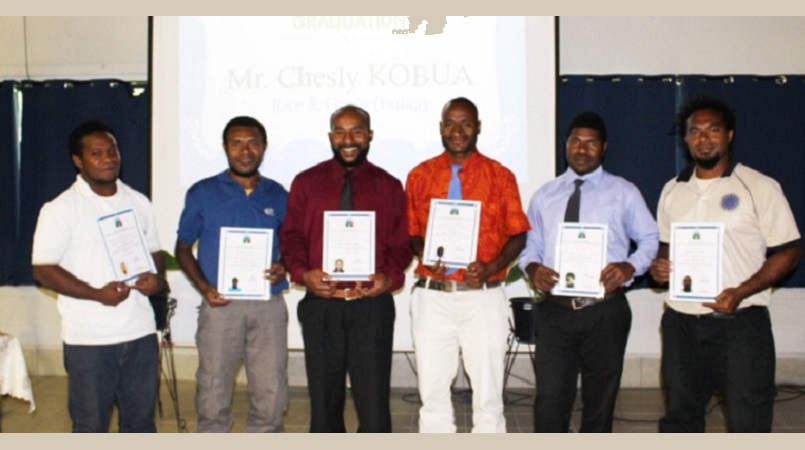
Six agricultural research cadets recently graduated from their two-year cadetship at the National Agricultural Research Institute in Lae, Morobe Province.
The cadets were attached to various disciplines at the Bubia and Aiyura research centres to develop their research skills and further enhance their work experience.
The cadets, based at the Momase Regional Centre’s Bubia station, included Chesly Kobua (rice and grain), Joel Pilon (biotechnology) and Wilfred Wau (crop protection).
The Highlands Regional Centre’s Aiyura-based cadets included Gena Kawale, Tai Kui and Jeffery Yapo, who were attached with crop iimprovement and soil and water management disciplines respectively.
Deputy director of NARI Dr Ramakrishna Akkinapally said the purpose of having such programs is to groom well trained and disciplined graduates to be future researchers for development institutions in PNG.
“Cadets in NARI are expected to experience and get trained in all aspects of agriculture for research and development,” Dr Ramakrishna said.
NARI plays a key role in developing human resource to contribute to excellence in agricultural research for a sustainable development.
This is evident through the two-year cadetship program where young cadets are attached to different programs in NARI to have hands-on experience in different aspects of agriculture research and to develop their technical, leadership and managerial skills and knowledge and general competency.
Since the inception of the program in 2000, about 47 cadets benefited from it. To date, NARI has retained some of the cadets who have advanced in achieving their master and doctoral degrees abroad while others have moved on to work with other organisations.
NARI’s personnel & human talent development manager Mary Tarabu said the program also aims to contribute and fulfill one of the Institute’s strategic objective under program 4 – institutional management and development.
“The program tries to promote and harness cadet talents that respond to the paradigm shift in agricultural research for development, where planned cadet project targets and milestones are achieved through effective utilisation of cadets by their mentors and supervisors in delivering the expected cadet project results and outputs,” Tarabu said.
Cadet officer Kobua said he would like to extend his career and specialise in rice and grain.
“With the knowledge and experience gained, I would like to further my career in the field of agronomy and breeding especially rice and grain crops or root and tuber crops such as cassava and yam,” he said.
For Pilon, he would also like to develop his skills as an upcoming scientist with NARI, specialising in crop breeding using molecular and mutagenesis technologies.
Research and development coordinators responsible for the cadets were pleased of the successful outcome during the graduation on March 30 this year.
Aiyura research and development coordinator Johannes Pakatul urged the graduates to take initiative and take on the challenges while Bubia research and development coordinator, Dr. Peter Gendua congratulated and challenged them to continue to work hard and show commitment.
“Agriculture is not a luxury field or job, we all must work hard and NARI is fine-tuning young people like you to be better people,” Dr. Gendua said.
The cadet scheme has various disciplines tied into the program including agronomy, animal nutrition, aquaculture, biometrics, crop breeding, crop improvement, chemistry, economics, entomology, genetic resources, geographic information systems, horticulture, information and communication, insect curator, livestock, pathology, post harvest, soil, tissue culture and weed management.
